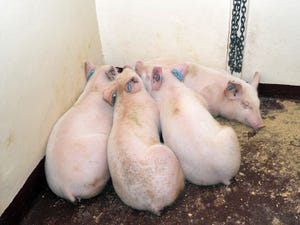Chile eradicates porcine reproductive and respiratory syndrome
PRRS costs the U.S. pork industry $664 million a year.
April 17, 2024

After a decade of concentrated efforts on a control and eradication plan, the Agricultural and Livestock Service announced that Chile has declared itself a country free of porcine reproductive and respiratory syndrome, now noting its position as the nation with the best sanitary condition for the pork industry in Latin America.
PRRS is a viral disease that exclusively affects pigs, it is not transmitted to humans, which means that it is not a zoonosis, but nevertheless, it has a significant impact on production, causing important economic losses and even affecting exports. In the United States alone, PRRS infections generate annual costs of approximately $664 million for producers, while in Europe losses are estimated at around $1.5 billion euros each year.
To manage and communicate its health status, each country must identify and declare the absence or presence of cases of different animal diseases through its official veterinary services to the World Organization for Animal Health. In Chile, this responsibility falls on the Agricultural and Livestock Service, which through resolution No. 2113/2024 officially declared Chile free of PRRS, marking an important milestone for the country in the field of animal health.
“The eradication of this disease demonstrates the excellence in the work carried out by the Agricultural and Livestock Service, the Association of Pig Producers, and all the professionals, technicians and academics involved in the control and eradication process. Likewise, it reinforces the success of the public-private collaboration model that the SAG has implemented for years with various actors in the production chain," said National Director of the SAG José Guajardo Reyes.
This disease manifests itself in two different ways, as explained by Reyes, who is also a veterinarian.: “On the one hand, the reproductive form mainly affects females, causing repetitions of heat, abortions, the death of piglets or the birth of weak offspring, resulting in decreased productivity. On the other hand, the respiratory form can affect animals of any age, weakening them and causing symptoms similar to those of a cold. This condition makes them more susceptible to other secondary diseases."
It is important to highlight that, since its appearance in 1980, the PRRS virus has spread globally, remaining present to this day. According to the WOAH, the virus affects most swine regions of the world. Numerous countries in Europe, Australia, Africa and much of Asia have reported extensive cases of this infection over the years, evidencing its wide distribution and the constant challenge it represents for the international swine industry.
In 2023, Chile produced 582,652 tons of pork, of which 297,203 tons were exported, generating $743 million.
You May Also Like



